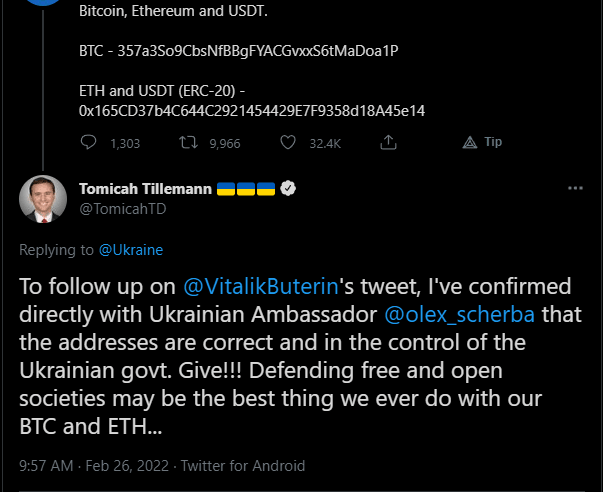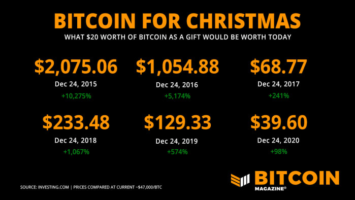“There’s a problem with bank accounts, something happened … the transactions are being stopped, for whatever reason.” – Overheard from Walter Lekh in Twitter Spaces conversation discussing avenues of donation in support of Ukraine
Activities in eastern Europe have taken the center stage for much of the world in the past few days. I’ve been doing the best I can to stay on top of information and intelligence that is coming through — one of the many beauties of the modern age and the opening of information that the internet and smartphones has allowed; aggressive and consistent flows of reports from the ground as they are coming in by the minute. This allows for greater distribution of information at a rate and effectiveness that supersedes previous centralized mechanisms of “news” distribution, which has already been under aggressive attack for events that have transpired in the past 24-plus months.
Coming out of these events of conflict and bloodshed have been reports of NGOs (non-governmental organizations) that have been [reportedly] working directly with the Ukrainian government since 2015. Additionally, the Ukrainian government’s official tTwitter account announced that they are now accepting donations of bitcoin and ether.
Before discussion goes any further I would like to expressly advise that nobody donate ANY funds until significant effort has been dedicated to verifying addresses as best as can be done. This is not a political admission of support, nor a call to action. There are significant efforts by multiple different parties engaging in deception and confusion of information and traffic at this time. Also, for those that are partaking in the viewing of any live streams of webcam footage and/or social media postings, DO NOT click on links provided by parties that you do not know or trust.
This is an extremely volatile situation, and these areas have become a battleground for intelligence organizations, with hacker groups such as Anonymous joining in efforts. Taking part online in these areas may actively insert yourself in the digital crossfire.
As I’ve been following along as closely as I can, one of the most shared NGOs is “SaveLife.” SaveLife recently had their Patreon account frozen, similar to recent events surrounding the Canadian Freedom Convoy, as well as many other tangentially related scenarios that have occurred over the past two years with regards to centralized organizations actively working to limit freedom of information, as well as money transmission.
“Bitcoin donations in support of Ukrainian forces skyrocketing” – OSINT spaces 02/24/22 10:04 p.m.
This ongoing, volatile situation highlights a multitude of concerns in the modern era.
First, the [arguably] obvious: Money the world over needs to be separated from the state, if not entirely, at least in part. Ukrainians have been discussing frustration with attempts to conventionally transfer funds internationally to financially support their families, as well as their fellow countrymen. Of particular note is Walter Lekh, a Ukrainian who is currently in the U.S. but has been spreading word online of developments for weeks as his family remains within Ukraine. Fiat rails provide too many points of friction to get funds where they are most needed in a timely manner.
Second, the bureaucracies and radically outdated systems of financial organizations continue to prove impotent when dealing with real-world developments, as they include the rapid transmission of information in the modern era. Their laggard rate of technological adoption continues to result in significant bottlenecks for effective distribution and dissemination of information. Mainstream media (MSM) has proven to be a general farce from developments over the past two years in particular. These centralized entities continue to fall short of legitimate and high-quality information as it is happening. Decentralized groups, affectionately referred to as OSINT (open-source intelligence) are being actively sought out as reputable sources. This has been witnessed by myself, by trusted reporters such as Mark Goldberg, as well as multiple politicians, ambassadors, and active duty intelligence officers. This proves the effectiveness, reach, and efficiency of decentralized operations beyond that of the Bitcoin network.
Third, these events also expose how increasingly dangerous much of the activities online are becoming. This dynamic also means that vulnerabilities of centralized financial systems (which most of the developed world rely on) are becoming increasingly more grave. The reason for this being that a centralized entity, while acting as a digital fortress, also provides a single point of attack, allowing for aggressors and bad actors to focus efforts towards breaching their defenses. It is very important to acknowledge that while some systems benefit from a blockchain, not all systems and mechanisms benefit — let alone require — a blockchain mechanism.
I have written previously for Bitcoin Magazine on the value of separating money from the state. Part of the reasoning for that article was to announce the launch of a Declaration of Monetary Independence, which is a digital product that allows for signing — operating similar to a petition, and will be sporting a physical display at the Bitcoin 2022 Conference in Miami this April.
This is a guest post by Mike Hobart. Opinions expressed are entirely their own and do not necessarily reflect those of BTC, Inc. or Bitcoin Magazine.























Comments (No)